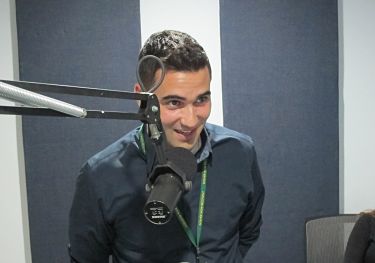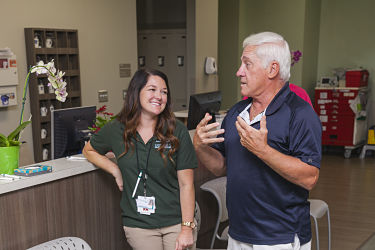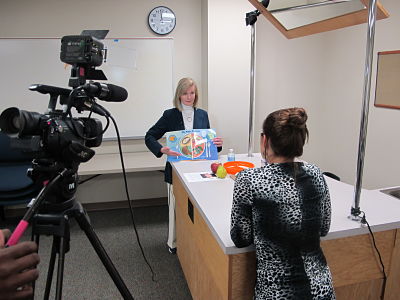Cardiac Rehabilitation 
2. Most Americans don't meet the recommendations of physical activity and exercise. For those who are active the focus should be structured, scheduled exercise rather than a hobby. Lack of exercise and physical activity is directly related to increased risk of cardiovascular disease. Exercise can act like medicine to protect against cardiovascular disease, but the side effects are weight loss, lower blood pressure, and improved cholesterol. Recommendations are 30 minutes a day of moderate intensity aerobic exercise on five or more days per week. Aerobic exercise is defined as continuous, rhythmic exercise using large muscle groups (golf doesn't count). If you have access to a stationary bicycle, treadmill, elliptical, or trail or neighborhood for a bicycle ride or walk, you can achieve a quality aerobic workout. Pencil in your daily exercise a week in advance so it won't be pushed aside. Thirty minutes of aerobic exercise a day keeps the doctor away!
— Erik LeRoy, MS, CEP, Cardiac Rehabilitation
1. High blood pressure, or hypertension, is often called "the silent killer." Blood pressure is a measure of how your heart pumps blood to the rest of the body. When the heart has to pump harder to get blood through the heart's vessels, this causes an increase in blood pressure. When left untreated, high blood pressure can lead to a stroke, heart attack, heart failure, kidney disease, vision loss, or sexual dysfunction. Most of the time, the symptoms for hypertension aren't obvious, which is why it's important for you to follow up with your doctor and have your blood pressure checked. Medications can help, but you can take control by making healthy lifestyle changes, such as eating a well-balanced, low salt diet, limiting alcohol intake, exercising regularly, and maintaining a healthy weight. You can fight high blood pressure, and Dosher is here to help.
— Natalie Swiger, MSN, RN Manager, Cardiac Rehabilitation

Cardiac Rehab Manager Natalie Swiger speaks to a visitor about cardiac rehab services.
Diabetes Education 
2. Every new year we make resolutions to change our lives for the better. The top resolution: Weight loss. That's not surprising because the Centers for Disease Control and Prevention report that obesity in the U.S. is an epidemic-two of three adults are now overweight. While many people know obesity can cause heart disease, stroke and type 2 diabetes, many don't realize that being overweight or obese is associated with an increased risk of 13 types of cancer: Meningioma, multiple myeloma, adenocarcinoma of the esophagus, and cancers of the thyroid, postmenopausal breast, gallbladder, stomach, liver, pancreas, kidney, ovaries, uterus, colon and rectum. These cancers can be prevented by maintaining a healthy weight. Dosher provides a comprehensive weight-loss program to help patients lose weight and stay healthy. Contact me for more information at 910-454-4731 or vickiallen@dosher.org.
1. As a registered dietitian, keeping up with the latest news and research related to nutrition is an important part of my job. Just last month I came across an article describing the results of a recent study conducted by Duke University School of Medicine which showed that calorie restriction, independent of weight loss, decreased the rate of aging in humans. This had been shown in worms, insects and mice but until now, not in humans. It is a well-known fact that restricting calories helps prevent and improve chronic diseases such as diabetes, heart disease and obesity but now we can add "anti-aging." Here at Dosher, we are dedicated to providing excellent healthcare and that is why we are now offering a new, medically supervised weight loss and weight management program to the residents of Brunswick County. For more information on any dietary topics, contact me at 910-454-4731 or vickiallen@dosher.org.
— Vicki Allen, RDN,LDN,CDE
Director, Dietetic Services and Outpatient Diabetes Education/Weight Management
Dosher Memorial Hospital













